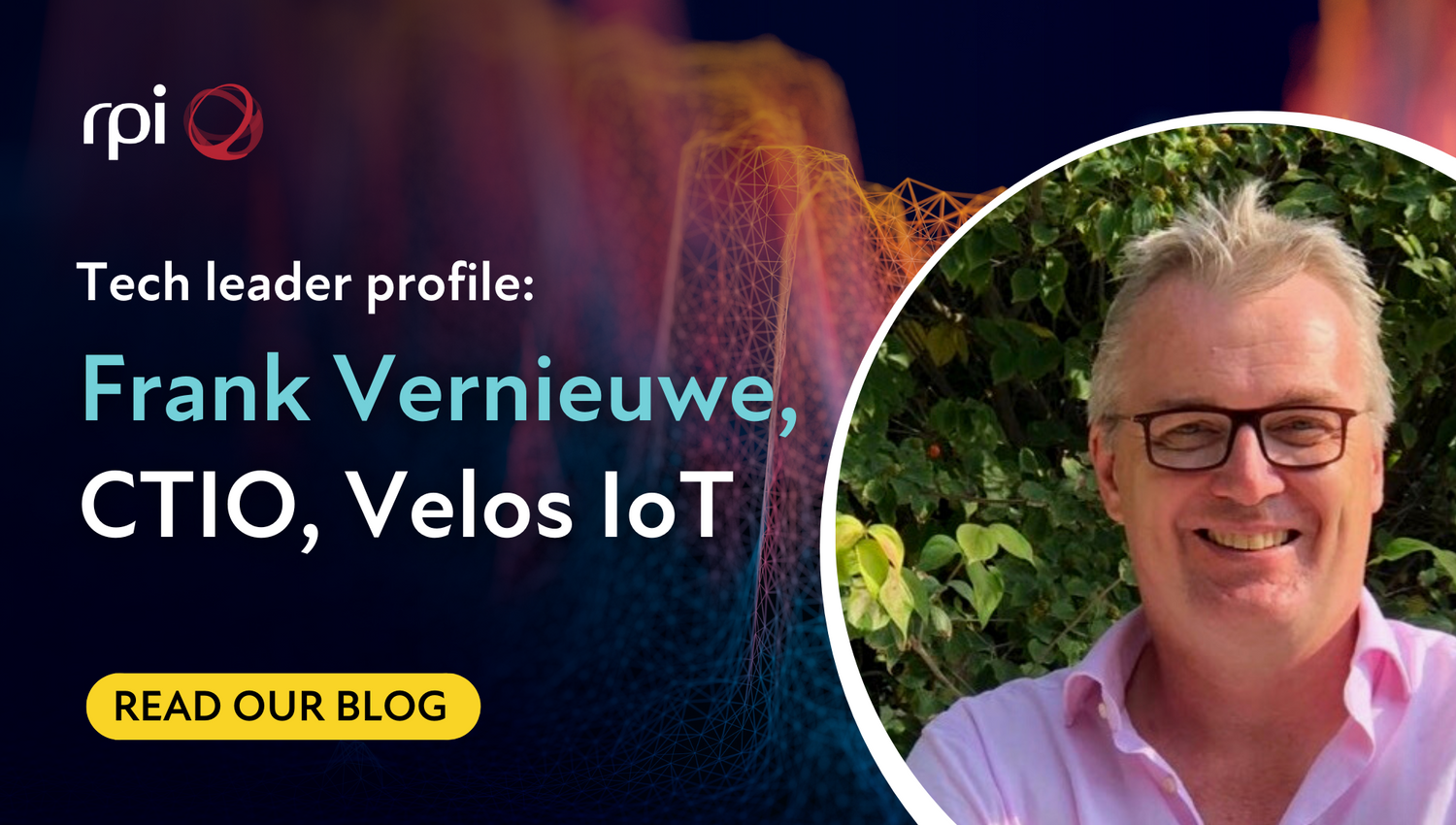Frank Vernieuwe is CTIO at Velos IoT, and one of many tech leaders that RPI has placed into cutting edge businesses around the world.
We spoke to Frank about how he got started in the Internet of Things (IoT), where the industry is heading, and what makes a good CTIO.
How did you come to work in IoT?
I’d spent most of my professional life in telco. Originally in mobile networks and then it grew to converged networks. So, it must have been a bit over two years ago, I was contacted in the midst of the pandemic by Jersey Telecom to ask if I was willing to fly over to the island to join them as their temporary CTO. They had had some network issues. It was a little bit of a rush, and the pandemic of course didn't really help.
The whole idea was for me to handle the transition between the old CTO and then the new one (who they were still searching for) and make sure that the network was run properly, and that any further disruptions were avoided. That was the original assignment.
That was exactly the time that JT was actually considering carving out an IoT business, which was surprising to me, because I didn't really know that they had over 10 million subscribers in the IoT space globally. So that became the project.
Then of course, all kinds of technical due diligence needed to be done, so more and more I became part of the team preparing to carve out that business and then incorporate it as a separate company to eventually sell it.
How did you come to join Velos IoT?
I was contacted by the new owners of JT IoT, a couple of weeks before they changed the name to Velos, and they said ‘We need a CTO. Are you interested?’ I'm at a stage in my career where I'm quite picky about the positions that I accept.
What was attractive to me was that it was the sweet spot between comfort and fascination. IoT companies typically are much more tech companies than they are telco companies. This new tech aspect of a business that has its roots in telco was fascinating and extremely motivating for me.
What have you been working on since becoming CTO?
With IoT you can literally connect everything and that's the key. Whether it's industrial devices, like machines and robots and production plants, all the way to devices inside people like connected pacemakers, and all kinds of other things.
All of these devices are bespoke. There are millions of different types, millions of different use cases, and millions of different business cases, but what they have in common is that they need infrastructure that allows them to connect.
Although IoT piggybacks on the existing telephone networks, it's quite specialist. The technical SLAs and KPIs that you need are not necessarily the same ones that you need as a traditional telco operator. My task has been to ensure global coverage, and to deliver that affordably.
What trends are you noticing in the industry?
A lot of IoT devices are using quite old technology, namely 2G and 3G, and a vast majority of devices can't even be upgraded to newer technologies. They're simply not compatible, because they’re so old. And on top of that, it's relatively easy to replace a phone, but it's much harder to replace a remote camera that’s deep in the woods of Canada, or a pacemaker that’s deep in a person. How do you do that?
Often the answer to that is to replace physical SIM cards with software, which is another trend. It’s quite complicated from a technological point of view, but one of our goals is to keep complexity away from our customers. The value proposition is that we give you one SIM, you connect your devices, and all the back-office complexity is presented in a simple application.
What makes a good CTO?
Of course, the CTO is the company director that focuses mostly on technology. Whereas the CFO, for example, will be focusing more on finance. Does that mean that the CFO doesn't know anything at all about technology? No. Does that mean that the CTO doesn't know anything at all about finance? No. So that wider understanding is really important.
The second thing for me is that technology can never be a goal in itself. Technology is a tool. So even if you’re a tech company, technology is in a supporting role. We support the operations team. We support the sales team. They listen to our customers, what do they need? And then as a technology department, you will then provide the best technology solution.
The last thing is that you should surround yourself with hyper-specialists who know way more than you about a topic. As a CTO you keep control of this complex ecosystem and you make sure these people working for you are delivering value, and they can grow, and help the company grow. For me, that’s what it’s all about.
If you want to secure the best tech leaders for your business, you need a partner with industry roots, sector heritage, and a network of technology and commercial experts — you need RPI. Contact people@rpint.com today.



